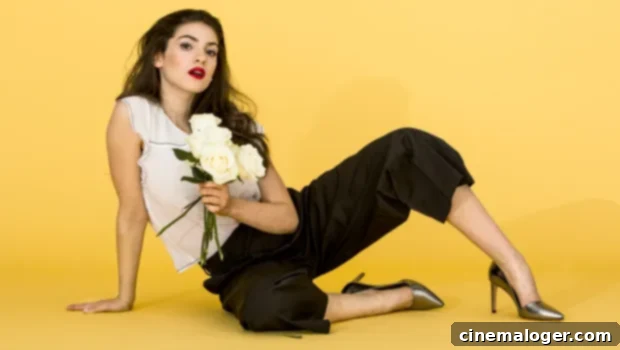Ella Rubin Takes Broadway by Storm: Juggling High School and a Powerful Role in ‘The Rose Tattoo’
At an age when many of her peers are focused solely on academic pursuits and social lives, Ella Rubin is brilliantly navigating a demanding dual existence: high school student by day, captivating Broadway star by night. Currently gracing the stage as the complex and vibrant Rosa in the acclaimed revival of Tennessee Williams’ comedic drama The Rose Tattoo, Rubin offers audiences a nuanced portrayal that belies her years. Her journey to Broadway, and her insightful approach to bringing such a multi-layered character to life, is a testament to her talent and dedication. This exclusive interview with HollywoodLife delves into the unique challenges and profound rewards of her remarkable theatrical experience.
Ella Rubin admits that the tale of how she secured the pivotal role of Rosa in the Broadway revival of Tennessee Williams’ enduring comedy, The Rose Tattoo, isn’t a dramatic, Hollywood-esque anecdote. However, she vividly recalls the transformative moment she first encountered the script, recognizing an immediate and powerful connection. “The moment I read the script, I needed to do everything in my power to get the role,” she shares, underscoring the deep impact the character had on her. Rubin highlights the rarity of such an opportunity for a young actress: “It’s so rare that I get to audition for a nuanced and layered teenage girl because I think a lot of times teenage girls are underestimated or aren’t depicted as powerfully as they truly are.” Indeed, Rosa is far from a simplistic caricature. Ella masterfully embodies Rosa, the rebellious yet emotionally vulnerable daughter of Serafina (portrayed by the incomparable Marisa Tomei), a Sicilian-American widow grappling with four years of profound grief following her husband’s death. Throughout the play, Ella meticulously navigates Rosa’s tumultuous teenage years, exploring her burgeoning sexuality, her desire to shed her Italian heritage, and her longing to assimilate into the image of a “sweet Southern girl.” Her performance captures the internal conflict of a young woman striving for independence while tethered to her family’s traditions and emotional turmoil.
In an exclusive interview with HollywoodLife.com, Ella offered profound insights into her meticulous process of getting into character, the rigorous training required to master both Louisiana and Sicilian accents, and the invaluable experience of sharing the stage with a seasoned actress like Marisa Tomei. Her candid reflections reveal a thoughtful and dedicated artist committed to honoring the depth of Williams’ writing and the authenticity of her character.
HollywoodLife: Your character, Rosa, is notably energetic and bold, yet she also carries a significant emotional weight. How did you approach understanding and embodying such a complex persona?
Ella Rubin: Bringing Rosa to life has been a dynamic and evolving process, influenced by several key factors. I find that her portrayal subtly shifts every night; a different inflection in a word can inform the entire sentence, which then reshapes the energy of the whole scene for me. My initial approach involved creating a detailed Venn diagram. This was particularly crucial because I portray Rosa at two distinct ages within minutes: first as a 12-year-old, and then rapidly transitioning to a 15-year-old. It was imperative for me to establish a palpable dichotomy between these two phases of her life—not just in terms of physicality and vocal quality, but also in her overall energy and worldview. The Venn diagram helped me map out her evolving characteristics, while also identifying the unchanging core of her personality. I believe we all possess fundamental values and traits that remain constant, and understanding Rosa’s core essence was my anchor for developing her throughout the play.
Beyond mapping her characteristics, delving into Rosa’s psychology was incredibly important. I achieved this primarily through journaling in her voice. I would fully immerse myself in character, then take my journal and write from her perspective about whatever scene or emotional state I was contemplating. Often, I would discover new facets of her personality and motivations simply through the act of writing. Another immersive technique I employed was creating playlists of music exclusively from the 1950s—Rosa’s era—selecting songs I imagined she would genuinely listen to. This helped me to connect with her emotional landscape and the cultural atmosphere she inhabited, adding an authentic layer to my performance.
HL: Rosa’s rebellion is a central theme. Do you believe this stems primarily from her mother’s response to their shared trauma, or from the profound loss of her father at a young, formative age?
Ella Rubin: I truly believe it’s a culmination of all these factors. Losing a father at any age is a devastating experience, and for Rosa, at just 12 years old, it was undoubtedly a traumatic event that shaped her early adolescence. However, what arguably amplified and, in some ways, overshadowed that initial trauma was her mother Serafina’s subsequent response. Rosa is inherently a strong and resilient girl, and I think she could have navigated her grief more effectively with a supportive maternal presence. Instead, she found herself without the emotional guidance she needed, compelled to prematurely take on a maternal role herself. This unexpected burden fostered a deep-seated resentment towards her mother and created a profound restriction on her own childhood. It’s precisely this prolonged suppression that fuels the dramatic “snap change” into rebellion we witness when she turns 15 and encounters Jack. She wasn’t inherently rebellious, but the sudden freedom, combined with years of pent-up emotion and a desperate need for attention, manifests in extreme acts, even to the point of threatening self-harm.
HL: Rosa seems convinced that Jack is ‘the one.’ Is this conviction a manifestation of her rebellion, or does she genuinely experience love for him?
Ella Rubin: Jack certainly holds a unique and special place in Rosa’s heart, and my own, but I believe her intense feelings for him are a complex blend of both genuine affection and the product of her burgeoning rebellion. She might have felt similar intense emotions for many other young men, given her age and emotional state. However, it was Jack’s reciprocation—his acknowledgment and return of her feelings—that truly propelled her into what she perceived as love. From the moment she first saw him, an undeniable connection formed. But more deeply, on a subconscious level, Rosa was desperately searching for something, anything, to cling to—a source of validation, attention, or escape. Jack emerged as the “perfect storm” in this regard. He offered her the emotional attention she craved, and crucially, he called her beautiful, a sentiment she had never before applied to herself. This external validation was a powerful catalyst for her feelings, intertwining her emotional needs with the romantic spark.
HL: One particularly compelling aspect of Rosa’s character is her sexual awakening as a young girl in the 1950s, which she experiences without apparent shame. This stands in stark contrast to the societal pressures that often lead women, even today, to feel shame about their sexuality.
Ella Rubin: It absolutely makes my heart soar that you noticed that detail! For women, especially, it resonates deeply because many of us are conditioned from a very young age to feel a certain shame or apprehension about our sexuality, largely due to a lack of open dialogue. It can be an incredibly confusing experience to feel sexual sensations as a young person without understanding if these feelings are normal or acceptable. For Rosa, I believe her remarkable lack of shame stems from a few powerful sources. Firstly, there’s an inherent, almost magical freeness about her character that is unique. Initially, I found myself questioning this, thinking, ‘How does this make sense for the 1950s?’ But then I remembered: this is Tennessee Williams, a master playwright who possessed an unparalleled understanding of writing authentic, complex women. More significantly, Rosa witnessed a very open and passionate sexual relationship between her parents when she was 12. We, as the audience, don’t always fully grasp Serafina’s wild, unbridled sexuality with Rosario, but Rosa, in her formative years (ages 10, 11, 12), certainly did. These are crucial developmental years, and how you perceive sexuality at that age profoundly influences your outlook later in life. So, Rosa was privy to a freeness and acceptance of sexuality that profoundly shaped her own experience, allowing her to explore it without the internalized shame many others endure.

HL: Your accent work in the show is particularly impressive, as you fluidly switch between a distinct Sicilian accent and a Louisiana twang. How did you manage to master such rapid transitions?
Ella Rubin: To be honest, when I first started, I truly had no idea how I was going to achieve it. It seemed incredibly daunting. The real breakthrough came during our rehearsal period when I began working intensively with a dedicated dialect coach. This coach was instrumental in helping me dissect and master the Louisiana accent and the Sicilian accent, meticulously working on each one separately until I had a solid grasp of their distinct sounds and rhythms. The next, and perhaps even more challenging, step was to practice vacillating between the two with incredible speed and precision, sometimes within a single line of dialogue. It wasn’t just about vocal mechanics; it was deeply rooted in Rosa’s mindset and motivations. Rosa speaks Sicilian for very specific reasons—primarily when she’s not trying to present herself as the assimilated American girl, often when Jack isn’t around, allowing her to express a more authentic, uninhibited part of her heritage. The accent becomes a powerful tool for characterization, signaling her internal and external struggles with identity.
HL: This marks your second collaboration with the acclaimed Marisa Tomei. What has it been like to share the stage with her, particularly in the role of your mother?
Ella Rubin: Working with Marisa Tomei again has been an incredibly enriching and truly special experience; I find myself constantly learning from her. She possesses a remarkable ability to help me ground myself in certain scenes, a skill I hadn’t deeply considered before our collaboration. Her guidance has been invaluable in shaping my performance, allowing me to find stability and emotional depth amidst the dramatic intensity of the play. Our on-stage chemistry as mother and daughter is something we meticulously built throughout the entire rehearsal period. It was essential for us to truly encapsulate that profound love between Serafina and Rosa, so that when the inevitable struggles and conflicts emerge, the audience feels the immense weight of their bond. I believe this powerful underlying love is precisely why mother-daughter relationships can be so fraught with strife—the depth of affection creates an equally intense emotional landscape that, at times, feels untamable and incredibly potent.
The Rose Tattoo continues to captivate audiences on Broadway, running at the American Airlines Theater in the heart of New York City. Ella Rubin’s powerful performance as Rosa is a must-see for anyone seeking a blend of classic American theater and contemporary talent.
